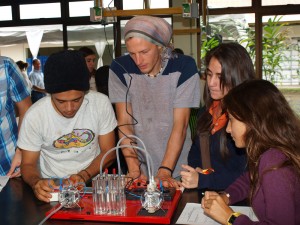EARTH University inaugurates first renewable energies laboratory in Central America
With the goal of disseminating knowledge in technologies for the production of clean energy, this morning EARTH University inaugurated the Center for Research and Development in Renewable Energies—a joint project between EARTH University and the Renewables Academy of Berlin (RENAC) with the support of the German Federal Ministry for the Environment, Nature Conservation and Nuclear Safety (BMU).

“The project serves a common objective of the three institutions to promote knowledge and technology transfer to ensure access to energy, economic growth and carbon footprint reduction in order to mitigate the impact of climate change” commented EARTH provost, Daniel Sherrard.
During the event, Commercial Attaché from the German Embassy in Costa Rica, Ms. Kerstin Purschel remarked, “Germany is specifically interested in supporting sustainable policies related to the environment, energy and climate change in Latin America. The creation of networks and the exchange of knowledge and technology transfer are fundamental to responding to the growing demand for energy and emissions of green house gases.”
 The first of its kind in Central America, the Center for Research and Development in Renewable Energies forms part of REN@EARTH, a project that seeks to stimulate solutions to address the energy challenges of the future through training in renewable energy and the development of sustainable technologies. The Center features high-tech equipment to enable users to get hands-on experience in alternative energy production, learning how to measure energy sources and design systems for domestic, agricultural or community use.
The first of its kind in Central America, the Center for Research and Development in Renewable Energies forms part of REN@EARTH, a project that seeks to stimulate solutions to address the energy challenges of the future through training in renewable energy and the development of sustainable technologies. The Center features high-tech equipment to enable users to get hands-on experience in alternative energy production, learning how to measure energy sources and design systems for domestic, agricultural or community use.
As part of the project, EARTH is offering free courses for technicians and engineers throughout Central America; short courses for students, professionals and business owners; as well as, an elective course for EARTH students called “Clean energies for rural areas,” taught by visiting professor Volkhard Scholz from the Leibniz Institute for Agricultural Engineering in Potsdam, Germany.




